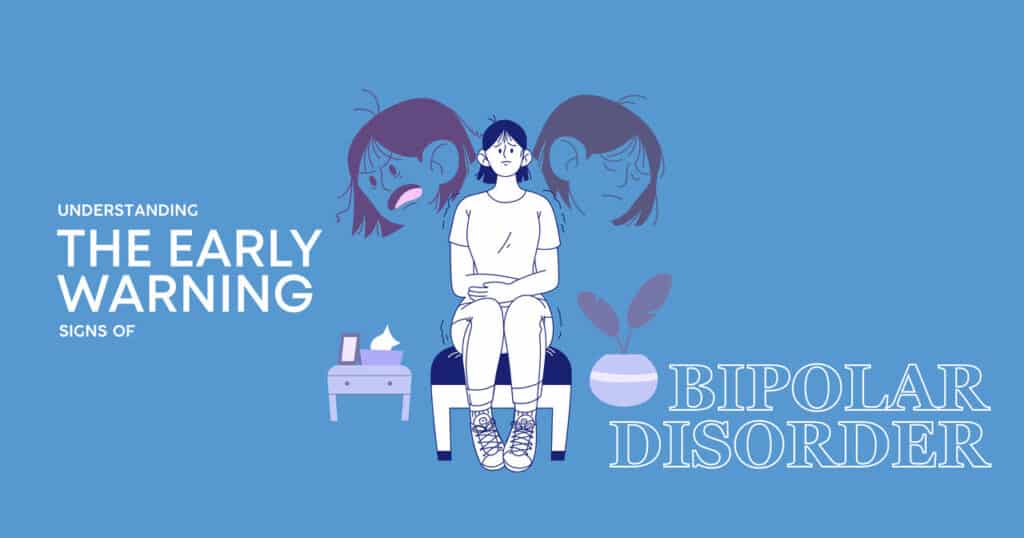Introduction to Bipolar Disorder
Ever feel like you’re on an emotional rollercoaster, and you can’t quite put your finger on why? Well, it might not just be a rough patch or a string of bad days. Bipolar disorder is a mental health condition marked by extreme mood swings that can sneak up on anyone. Understanding the early warning signs of bipolar disorder can be a game-changer. It’s like having a mental health radar that helps you detect trouble before it spirals out of control.
What Is Bipolar Disorder?
Bipolar disorder is a mental health condition characterized by extreme mood swings that include emotional highs (mania or hypomania) and lows (depression). These changes can impact sleep, energy levels, activity, judgment, behavior, and cognitive clarity. Bipolar disorder manifests in different forms, such as Bipolar I, Bipolar II, and Cyclothymic Disorder, each differing in severity and symptomatology. Understanding the nature of bipolar episodes can help differentiate between a manic episode, a depressive episode, or a mixed episode.
The Importance of Early Detection
Early detection of bipolar disorder is crucial. The earlier you catch it, the better you can manage it. Knowing the early signs can lead to timely intervention, which can help manage symptoms of depression, reduce the risk of suicide, and improve overall quality of life.
Recognizing early signs may involve monitoring for patterns of mood swings, shifts in mood, and changes in daily life activities. This awareness can facilitate more productive lives and enhance coping strategies.
Common Early Warning Signs of Bipolar Disorder
Drastic Mood Changes
One of the signs of bipolar disorder is significant mood swings. These aren’t just your typical ups and downs. We’re talking about episodes of mania or episodes of depression characterized by periods of intense happiness, irritability, or energy (manic episodes) followed by extreme sadness or hopelessness (depressive episodes).
Recognizing these distinct periods can be crucial for accurate diagnosis and treatment.
Manic Symptoms:
- Feeling overly happy or “high” for long periods
- Having a decreased need for sleep
- Talking very fast, often with racing thoughts
- Feeling overly confident
- Engaging in risky behaviors, like spending sprees or impulsive sex
Depressive Symptoms:
- Feeling sad or hopeless for extended periods
- Withdrawal from friends and family
- Loss of interest in activities once enjoyed
- Significant changes in appetite (either excessive appetite or lack of appetite)
- Fatigue or lack of energy
Changes in Sleep Patterns
Bipolar disorder often disrupts sleep. During manic phases, you might feel like you don’t need much sleep, whereas during depressive phases, you might sleep too much or struggle with insomnia. Poor sleep patterns can exacerbate the symptoms of depression and bipolar symptoms.
Unexplained Irritability or Aggression
People with bipolar disorder often experience irritability or aggression that seems out of proportion to the situation. If you frequently snap at others or feel unusually agitated, it might be a sign to watch out for.
Rapid Speech and Racing Thoughts
During manic episodes, you might notice you talk unusually fast and jump from one topic to another. Your thoughts might be racing so quickly that keeping up is hard, making it difficult to engage in daily life activities.
Impulsivity and Poor Judgment
Engaging in impulsive behaviors without considering the consequences is a red flag. This might include spending sprees, reckless driving, or impulsive decisions out of character, which can lead to severe consequences.
Feelings of Guilt or Worthlessness
During depressive episodes, it’s common to feel an overwhelming sense of guilt or worthlessness. These intense and persistent feelings make it difficult to see a way out, leading to feelings of hopelessness and potentially increasing the risk of suicide.
When to Seek Help
If you or someone you know is experiencing these symptoms, seeking help is essential. Early intervention can make a significant difference. Here are a few steps to consider:
- Talk to a Mental Health Professional: A psychologist, psychiatrist, or counselor can provide an accurate diagnosis and treatment plan.
- Educate Yourself: Understanding bipolar disorder can help you manage your symptoms and communicate effectively with healthcare providers.
- Build a Support Network: Having friends, family, or support groups can help provide emotional support and practical advice.
FAQs About Bipolar Disorder
What causes bipolar disorder?
The exact cause of bipolar disorder isn’t known, but it’s believed to be a combination of genetic, biochemical, and environmental factors. A family history of mental disorders can also be a significant risk factor.
Can bipolar disorder be cured?
Well, there is no cure for bipolar disorder, but it can be managed effectively with medication, therapies, and lifestyle changes.
How is bipolar disorder diagnosed?
A mental health professional will conduct a thorough evaluation, which may include a physical exam, psychiatric assessment, and mood charting.
What treatments are available for bipolar disorder?
Treatment typically includes medication (mood stabilizers, antipsychotics, and sometimes antidepressant medications), psychotherapy, and lifestyle modifications. Electroconvulsive therapy may also be considered for severe forms of bipolar disorder that do not respond to other treatments.
Is bipolar disorder hereditary?
Bipolar disorder can run in families, indicating a genetic component. However, not everyone with a family history will develop the disorder.
Managing Bipolar Disorder
Medication
Medications are often prescribed to help manage mood swings and other symptoms. Common medications include mood stabilizers, atypical antipsychotics, and sometimes antidepressant medications. Following your doctor’s instructions and communicating any side effects is crucial for ongoing treatment.
Therapy
Cognitive-behavioral therapy (CBT) or psychoeducation can be incredibly beneficial. Therapy can help you understand your condition, develop coping strategies, and improve your interpersonal relationships. Behavioral therapy and interpersonal therapy are also effective in addressing mood symptoms.
Lifestyle Changes
Making healthy daily routines can make a significant difference. This includes:
- Regular Exercise: Helps manage stress and improve mood.
- Healthy Diet: Eating a balanced diet can affect your energy levels and overall well-being.
- Sleep Hygiene: Maintaining a regular sleep schedule can stabilize mood swings.
- Avoiding Drugs and Alcohol: These substances can trigger or worsen symptoms and lead to substance use disorder.
Support Networks
Having a solid support network can provide emotional and practical assistance. It would help if you considered joining a support group to share personal experiences and strategies with others who understand what you’re going through.
Final Thoughts
Bipolar disorder isn’t just an adult issue; it can affect children and teens too. Recognizing the early warning signs in young people is vital for early intervention and treatment. Symptoms in children might include severe mood swings that differ from their usual mood, hyperactivity, impulsive behavior, and periods of depression. If you notice these signs in your child or teen, it’s essential to seek professional help promptly.
Understanding and addressing these aspects of bipolar disorder can significantly enhance the ability to manage this lifelong condition effectively, leading to a more stable and fulfilling life.




